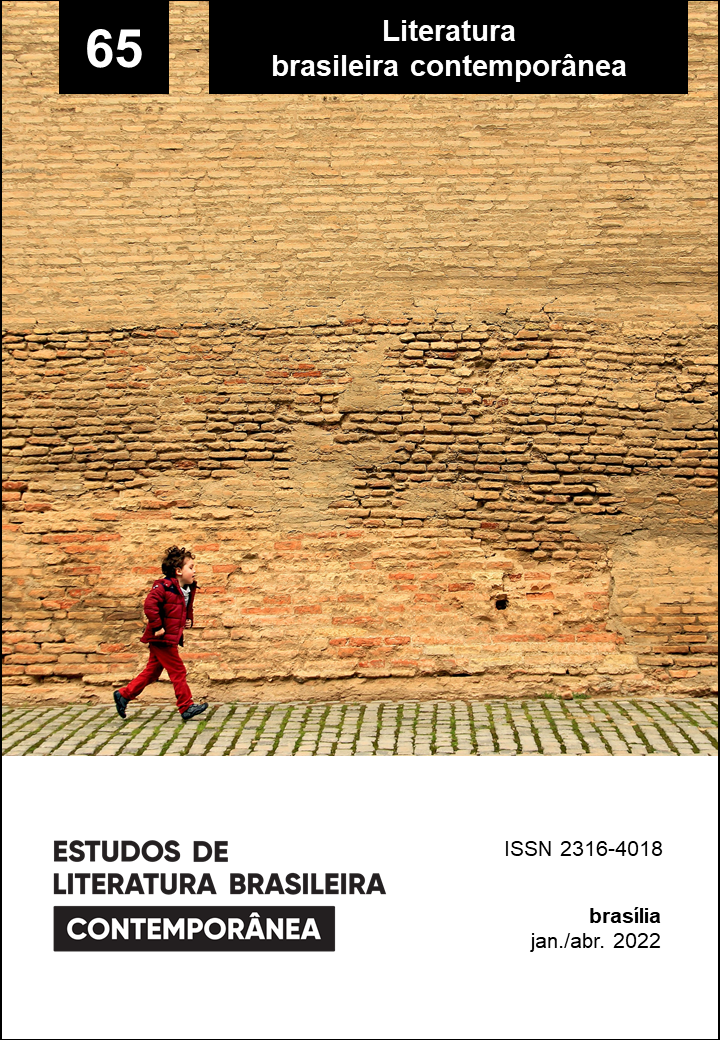The ironic discourse in short narratives by Bernardo Kucinski
DOI:
https://doi.org/10.1590/2316-40186502Keywords:
Bernardo Kucinski, irony, military dictatorshipAbstract
Irony consists on a relevant linguistic-literary tool, either to construct ambiguous discourses as to develop the comical sense, or even to stablish a critique environment about political and social conflicts. The present paper aims to analyze in Bernardo Kucinski short stories published at Você vai voltar pra mim e outros contos which presents characters in violent and oppressive situations during Brazilian military dictatorship. It was noted that the employment of the irony turned into a decisive role to conduct the narrative interpretation, that conjoin all the potential of this resource to expose the arbitrary act and the violence from the turbulent context of the Brazilian military dictatorship.
Downloads
References
ALAVARCE, Camila S. (2009). A valorização do elemento dual e o papel do leitor. In: ALAVARCE, Camila S. A ironia e suas refrações: um estudo sobre a dissonância na paródia e no riso. São Paulo: Editora UNESP; Cultura Acadêmica. Disponível on-line em: http://books.scielo.org/id/5dcq3. Acesso em: 11 out. 2019.
BRAIT, Beth (1996). Ironia em perspectiva polifônica. Campinas: Editora da UNICAMP.
BRASIL (1995). Lei n° 9.140, 4 de dezembro de 1995. Reconhece como mortas pessoas desaparecidas em razão de participação ou acusação de participação em atividades políticas, no período de 2 de setembro de 1961 a 15 de agosto de 1979. Diário Oficial da União: seção 1, Brasília, DF, p. 19985. Disponível em: https://www2.camara.leg.br/legin/fed/lei/1995/lei-9140-4-dezembro-1995-348760-normaatualizada-pl.html Acesso em: 8 out. 2019.
BRASIL (2007). Secretaria Especial dos Direitos Humanos. Comissão Especial sobre Mortos e Desaparecidos Políticos. Direito à memória e à verdade: comissão especial sobre mortos e desaparecidos políticos. Brasília: Secretaria Especial dos Direitos Humanos, 2007. Disponível em: https://www.gov.br/mdh/pt-br/centrais-de-conteudo/memoria-e-verdade/direito-a-memoria-e-a-verdade-2013-comissao-especial-sobre-mortos-e-desaparecidos-politicos/view Acesso em: 8 out. 2019.
CARIGNANO, Maria Laura Moneta (2007). Eva Perón de Copi. Ironia, história e mito na literatura contemporânea. Estudos Linguísticos. São Paulo, v. 36, n. 3, p. 281-287, set./dez. 2007. Disponível em: http://www.gel.hospedagemdesites.ws/estudoslinguisticos/edicoesanteriores/4publica-estudos-2007/sistema06/107.PDF Acesso em: 8 out. 2019.
DUARTE, Lélia Parreira (1989). Ironia, revolução e literatura. Cadernos de Linguística e Teoria da Literatura. Belo Horizonte, v. 11, n. 22-24, p. 92-113, 1989/2016. Disponível em: http://www.periodicos.letras.ufmg.br/index.php/cltl/article/view/10164. Acesso em: 8 out. 2019.
DUARTE, Lélia Parreira (1994). Ironia, humor e fingimento literário. In: DUARTE, Lélia Parreira (org.). Resultados de pesquisa: ironia e humor em literatura. Belo Horizonte: UFMG. p. 54-78. Disponível em: http://www.periodicos.letras.ufmg.br/index.php/cadernos_pesquisa/article/view/11451 Acesso em: 8 out. 2019.
DUARTE, Lélia Parreira. (2006) Arte & manhas da ironia e do humor. In: DUARTE, Lélia Parreira. Ironia e humor na literatura. Belo Horizonte: Editora PUC Minas; São Paulo: Alameda. p. 17-50. Disponível em: http://www.leliaparreira.com.br/images/ensaios/arte_e_manhas.pdf. Acesso em: 8 out. 2019.
HUTCHEON, Linda (2000). Teoria e política da ironia. Belo Horizonte: Editora UFMG.
JORNALISTA Ottoni Fernandes ajudaria Comissão da Verdade a localizar centro de tortura (2013). O Globo, Rio de Janeiro, 1º jan. Disponível em: http://oglobo.globo.com/brasil/jornalista-ottoni-fernandes-ajudaria-comissao-da-verdade-localizar-centro-de-tortura-7248516 Acesso em: 11 out. 2019.
KEHL, Maria Rita (2014). A ironia e a dor. In: KUCINSKI, Bernardo. Você vai voltar pra mim e outros contos. São Paulo: Cosac Naify.
KUCINSKI, Bernardo (2012). K. Relato de uma busca. São Paulo: Expressão Popular.
MAIA, Maria Helena Pinheiro (1999). As formas da paródia em O ano da morte de Ricardo Reis de José Saramago. Dissertação (Mestrado em Estudos Literários) – Universidade Estadual Paulista, Araraquara.
MALISKA, Mauricio Eugênio; SOUZA, Silvana Colares Lucio de (2012). A ironia e o humor: uma construção teórica. In: ENCONTRO DO CELSUL – CÍRCULO DE ESTUDOS LINGUÍSTICOS DO SUL, 10., 24-26 out. 2012, Cascavel. Anais [...] Cascavel: Unioeste, 2012, p. 1-10. Disponível em: http://www.celsul.org.br/Encontros/10/completos/xcelsul_artigo%20(158).pdf Acesso em: 11 out. 2019.
MILITÂNCIA de jornalista inspira contos de Kucinski. Revista do Brasil, n. 80, 16 fev. 2013. Disponível em: https://www.redebrasilatual.com.br/revistas/2013/02/militancia-de-jornalista-inspira-contos-de-kucinski/. Acesso em: 11 out. 2019.
MUECKE, Douglas Colin. (1995). Ironia e o irônico. São Paulo: Perspectiva.
NETTO, Marcelo; MEDEIROS, Rogério (2012). Memórias de uma guerra suja. Rio de Janeiro: Topbooks.
PEREIRA, Helena Bonito Couto (2015). O estudo da ironia em sala de aula. Todas as Letras, São Paulo, v. 17, n. 3, p. 25-35, ago./dez. 2015. Disponível em: https://bit.ly/3pDy4EZ. Acesso em: 14 out. 2019.
Downloads
Published
How to Cite
Issue
Section
License
Copyright (c) 2022 Helena Bonito Couto Pereira, Fernanda Reis da Rocha

This work is licensed under a Creative Commons Attribution-NoDerivatives 4.0 International License.
Authors who publish in this journal agree to the following terms:
a) The authors maintain the copyright and grant the journal the right of first publication, the work being simultaneously licensed under the Creative Commons Attribution License-Non Commercial 4.0 which allows the sharing of the work with acknowledgment of the authorship of the work and publication this journal.
b) Authors are authorized to enter into additional contracts separately, for non-exclusive distribution of the version of the work published in this journal (eg publish in institutional repository or as a book chapter), with authorship recognition and publication in this journal.
c) Authors are allowed and encouraged to publish and distribute their work online (eg in institutional repositories or on their personal page) after the editorial process, as this can generate productive changes, as well as increase the impact and citation of published work (See The Effect of Free Access).
d) The authors of the approved works authorize the magazine to, after publication, transfer its content for reproduction in content crawlers, virtual libraries and the like.
e) The authors assume that the texts submitted to the publication are of their original creation, being fully responsible for their content in the event of possible opposition by third parties.


